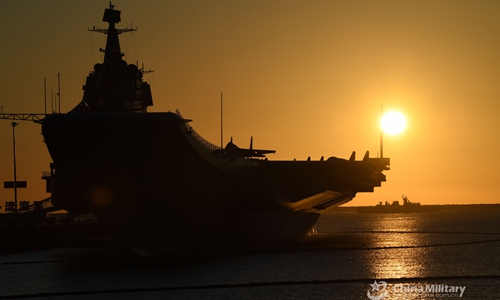China's two aircraft carriers in apparent simultaneous exercises for 1st time: reports
By Liu Xuanzun Source: Global Times Published: 2020/9/6 18:32:27

The picture shows aircraft carrier Shandong berths at a naval port in Sanya. China's first domestically-made aircraft carrier Shandong (Hull 17) was officially commissioned to the PLA Navy at a military port in Sanya, South China's Hainan Province, on the afternoon of December 17, 2019, making China one of the few countries in the world that have multiple carriers. Photo:China Military
After China's second aircraft carrier, the Shandong, embarked on a training voyage in the Bohai Sea last week, the country's first carrier, the Liaoning, was spotted leaving its base and sailing in the Yellow Sea during the weekend. This was the first time known to the general public that China had two active aircraft carriers out at sea for apparent simultaneous exercises.
With the Shandong gradually gaining combat capability and the two carriers training together, China will eventually be capable of deploying a dual carrier combat group, a tactic useful in high-intensity warfare — including possible reunification-by-force operations on the island of Taiwan and resistance against US provocations in the South China Sea, analysts predicted on Sunday.
Citing foreign commercial satellite images, Beijing-based Modern Ships magazine reported on Saturday that the Liaoning recently set out from its base in Qingdao, East China's Shandong Province for exercises.
The Liaoning was in the Yellow Sea not far from its base as of Saturday, according to foreign commercial satellite services openly accessible to the general public. Photos taken by local residents and circulated on social media also showed the Liaoning had recently embarked on a voyage.
The ship's movement came shortly after the country's other carrier — the Shandong — set out from a shipyard on Tuesday for military exercises in the Bohai Sea, Hong Kong-based news website wenweipo.com reported at that time.
The Shandong's presence in the Bohai Sea was also confirmed by satellite images on Thursday.
This was apparently the first time China's two aircraft carriers have been on training missions simultaneously since the country's second carrier Shandong entered service in December 2019, the Modern Ships report said.
China has not yet officially confirmed the two carriers' operations, not to mention details on their missions
The wenweipo.com report predicted the Shandong would likely conduct integrated training with fighter jets, and observers speculated that the Liaoning could be just conducting routine training missions, since it is not far away from its port.
The report by Modern Ships magazine said whether the two carriers for the first time form a combat group for exercises, conduct back-to-back confrontational exercises, or hold long-range coordination exercises as two independent combat groups, the latest move will open a new chapter for the Chinese People's Liberation Army (PLA) Navy to deploy carriers.
A Chinese military expert told the Global Times on Sunday on condition of anonymity that since China has launched its second carrier, it is only a matter of time before the PLA Navy gains the capability to simultaneously operate two carriers in multiple approaches, including a dual carrier combat group.
Compared with two separate carrier combat groups, a dual carrier combat group offers a significant boost in efficiency and capability, particularly in the deployment of fighter jets, the expert said.
Even if these simultaneous exercises do not see the two carriers interact with each other this time, it will be another significant step toward a true dual carrier era for the PLA Navy, the expert said.
Beijing-based naval expert Li Jie told the Global Times that China's two carriers will become key forces at a time when China has been facing military pressure from countries like the US in the Taiwan Straits and the South China Sea, and potentially from India on China's key maritime transport lanes.
Two aircraft carriers can squeeze the island of Taiwan from different angles, and together with the DF-21D and DF-26 anti-ship ballistic missiles of the PLA Rocket Force, they can lock down the island and deny possible US intervention, Li said. They can also play a role in protecting crucial maritime transport lanes like the Strait of Malacca.
Posted in: MILITARY,REPORTER2